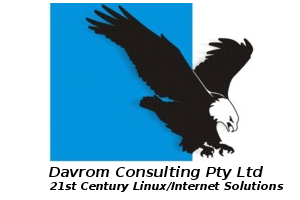





Back to Newsletters DAVROM CONSULTING Newsletter - Issue # 11 - Dated: Tue Jun 18 23:41:26 EST 2002 From the desk of David Clark Welcome to issue number 11. Some quick milestones have been reached recently, the first one is that we have celebrated our one year anniversary - DAVROM CONSULTING was registered on the 1st of June, 2001. Another date of mention is Friday the 17th of May which was actually a SUNday for us - we announced that we are offering SUN support to customers. From the support workload, it seems a lot of "ye olde DAT drives" are failing out there in the field after years of faithful services. We have sold three DAT drives in the last 6-8 weeks to replace faulty units. I guess hardware doesn't last forever but the reliability of the UNIX operating system puts us in that frame of mind as it just keeps on going - just the hardware can't always keep up. I would like to thank the reader for their time in reading this newsletter. David.M.Clark Don't just backup, verify Pursuant to my mention of failing tape drives in the last six weeks, one disturbing thing to find was that the tape backups on two of these sites were empty! It appears that the faulty units got as far as starting to write some pre-amble to the tapes that basically left the tapes.... empty. If the script or backup program you are running has a verify option, you will have some peace of mind. If it doesn't at least list back the tape contents for checking, then it wouldn't hurt to check these manually yourself using the respective tape 'read' commands. Some examples of listings back tape contents to the screen are: tar -tvf /dev/rStp0 or cpio -itcvB for non-SCO OpenServer systems, simply replace the /dev/rStp0 with the device name for your respective tape drive (eg,. /dev/rmt0, /dev/mt0 etc). Remember, a backup is only as good as the media it is stored on and the qualification of what is physically on them. Increased Spam I have noticed through DAVROM and heard from others out there latelty that Spam is on the increase. At times I can get around 3-7 spam e-mails per day - absolutely useless information and sometimes containing offensive material. Most people just block the address of the spam sender in their e-mail reader but this can prove ineffective as the sender simply changes the originating address each time (freddy12@mynet.org, fred12@mynet.org). Some nice features of UNIX/Linux Sendmail servers is the ability to block the spammers by either their originating address (someguy@someguy.org), domain name (someguy.org) or the actual machine/IP address. The ability to actually deny a known originating server access to your server/domain is the best of all. If you are using Sendmail on SCO OpenServer you have limited anti-spam measures with the stock standard installation as the anti-spam rules advised in /usr/lib/mail/antispam/README only work for stopping your server from being used as a relay server (a server that allows spammers to pass their e-mail to others via your server) - the other anti-spam rules do not seem to function (feedback welcome here). One powerful way to block Internet servers that are the originating source of spam, is to block the server by its IP address at the IP firewall level depending on what IP-Forward program is running on your server (IPChains, IPTables, ipf). By blocking the offending server at this level the e-mail doesn't even make it into Sendmail to process. No more spam please, I'm full. Some quick bits Caldera has united with Conectiva S.A, SuSE Linux AG and Turbolinux Inc. to develop a streamlined release of Linux under the name of UnitedLinux - with a core focus of providing a standardised platform for development and certification. This direction has been welcomed by the major hardware and software vendors. Redhat announced a joint offering with Dell and Oracle to provide a robust solution for the enterprise market. SUN Microsystems will be announcing a new software direction with a focus on web server based applications - more details after June 19th. SUN has also released Solaris 9, its latest operating system offering. Tech Tip Samba Client access to Windows: If you need to copy some files from your UNIX/Linux server back to a Windows PC, consider using the Samba 'smbclient'. 'smbclient' allows you to have a command line based login access from UNIX/Linux to a MS Share on a Windows PC. Consider the following example: /usr/bin/smbclient //rosie/c This open a "ftp" like access session to a Windows PC called "rosie" which is has a share called "c". When you invoke the above command you are challenged for a password and depending on the security level on the Windows share (password protected or not), you can gain access to the Windows hard disk. From here you can use command such as "get", "put", "dir" and "mget". Back to Newsletters 





Website design by Davrom Consulting Pty Ltd This site is fully tested with Google Chrome and Firefox web bowsers Home Page | Support | Misc | David's Pages | Podcasts | Contact Us | Blog |
